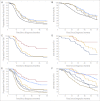BRCA mutation frequency and patterns of treatment response in BRCA mutation-positive women with ovarian cancer: a report from the Australian Ovarian Cancer Study Group
- PMID: 22711857
- PMCID: PMC3413277
- DOI: 10.1200/JCO.2011.39.8545
BRCA mutation frequency and patterns of treatment response in BRCA mutation-positive women with ovarian cancer: a report from the Australian Ovarian Cancer Study Group
Erratum in
- J Clin Oncol. 2012 Nov 20;30(33):4180
Abstract
Purpose: The frequency of BRCA1 and BRCA2 germ-line mutations in women with ovarian cancer is unclear; reports vary from 3% to 27%. The impact of germ-line mutation on response requires further investigation to understand its impact on treatment planning and clinical trial design.
Patients and methods: Women with nonmucinous ovarian carcinoma (n = 1,001) enrolled onto a population-based, case-control study were screened for point mutations and large deletions in both genes. Survival outcomes and responses to multiple lines of chemotherapy were assessed.
Results: Germ-line mutations were found in 14.1% of patients overall, including 16.6% of serous cancer patients (high-gradeserous, 17.1%); [corrected] 44% had no reported family history of breast orovarian cancer.Patients carrying germ-line mutations had improved rates of progression-free and overall survival. In the relapse setting, patients carrying mutations more frequently responded to both platin- and nonplatin-based regimens than mutation-negative patients, even in patients with early relapse after primary treatment. Mutation-negative patients who responded to multiple cycles of platin-based treatment were more likely to carry somatic BRCA1/2 mutations.
Conclusion: BRCA mutation status has a major influence on survival in ovarian cancer patients and should be an additional stratification factor in clinical trials. Treatment outcomes in BRCA1/2 carriers challenge conventional definitions of platin resistance, and mutation status may be able to contribute to decision making and systemic therapy selection in the relapse setting. Our data, together with the advent of poly(ADP-ribose) polymerase inhibitor trials, supports the recommendation that germ-line BRCA1/2 testing should be offered to all women diagnosed with nonmucinous, ovarian carcinoma, regardless of family history.
Conflict of interest statement
Authors' disclosures of potential conflicts of interest and author contributions are found at the end of this article.
Figures



References
-
- Rubin SC, Benjamin I, Behbakht K, et al. Clinical and pathological features of ovarian cancer in women with germ-line mutations of BRCA1. N Engl J Med. 1996;335:1413–1416. - PubMed
-
- Sarantaus L, Vahteristo P, Bloom E, et al. BRCA1 and BRCA2 mutations among 233 unselected Finnish ovarian carcinoma patients. Eur J Hum Genet. 2001;9:424–430. - PubMed
-
- Malander S, Ridderheim M, Måsbäck A, et al. One in 10 ovarian cancer patients carry germ line BRCA1 or BRCA2 mutations: Results of a prospective study in Southern Sweden. Eur J Cancer. 2004;40:422–428. - PubMed
-
- Risch HA, McLaughlin JR, Cole DE, et al. Population BRCA1 and BRCA2 mutation frequencies and cancer penetrances: A kin-cohort study in Ontario, Canada. J Natl Cancer Inst. 2006;98:1694–1706. - PubMed
-
- Jacobi CE, van Ierland Y, van Asperen CJ, et al. Prediction of BRCA1/2 mutation status in patients with ovarian cancer from a hospital-based cohort. Genet Med. 2007;9:173–179. - PubMed
Publication types
MeSH terms
Substances
LinkOut - more resources
Full Text Sources
Other Literature Sources
Medical
Miscellaneous

